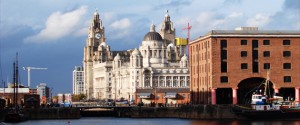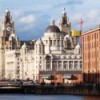 Originally published by L.S. Media. May 18th 2012.
Originally published by L.S. Media. May 18th 2012.
L.S. Media Rating ****
Cast: Des Flanagan, John Bradburn, John Mitchell, Josie Parks, Peter Highton, Jane Hill, Wendy Jones, Mark Jones, Dominic Pitt, Lee Gibson, Russell Parry.
There are not many cities within England that reflects on its past nor has much inspired and genuine hope for its future as Liverpool. The history is there for all to see and even on the most cursory of glances by a visitor to the city at any of the walls or historic monuments dotted around will see how the years have shaped the city’s heart.
Liverpool theatres does this well and the reflection on the heart of the city can sometimes be enlightening and sometimes unsettling but it needs to be seen and never forgotten. Set against the dockers’ strike of 1995, Franny Conlin’s incredible play, Wild Flowers, shows perfectly the destruction of a family unit when one member makes one drastic decision, the fall out and spiralling downward slope that it takes.
The cast of Wild Flowers had only performed this stunning social commentary on two other occasions in Crosby. To bring it to the Unity Theatre was an excellent choice. The theatre itself blends and takes to its soul any play that showcases Liverpool in good light and in bad, the highs and the extreme lows that make this city one of the most dramatic and exhilarating cities in the U.K. to live in. It is possible to look at the play as allegory, a clever device, that not only shows how drugs and those that deal in them can split a family apart but also how it can tear apart at the fabric of a village, town or city. How once you take the heart of a city away from its people, then what do the populace have left to have hope in. Liverpool has fared better than most in recent years, however the undercurrent is never far away and it’s always ready to tear the place apart.
The cast were incredible and has had been mentioned, this was only the third time it had been performed but the genuine love that each actor had for their own part was telling and leapt off the stage and into audiences hearts. Amongst these was a very powerful performance by John Bradburn as the misguided Jimmy Lavelle, a wonderful portrayal of a father under extreme pressure by John Mitchell and an outrageously fantastic Russell Parry as the boy’s uncle James Lavelle whose singing during the evening complemented every member of the cast perfectly.
To understand Liverpool and its history is sometimes easy, sometimes people get it wildly wrong, but to fully “get” Liverpool, these wonderful nuggets that appear from time to time show Liverpool in its real and brutally honest and much loved self, something other cities try to shy away from.
Ian D. Hall
